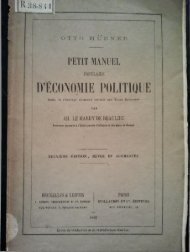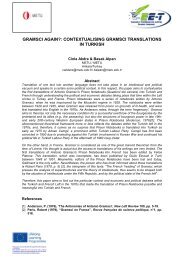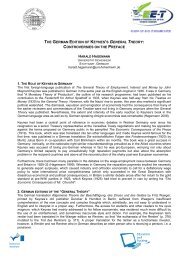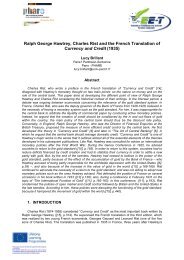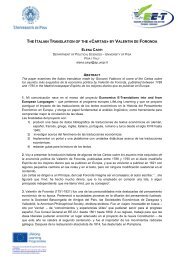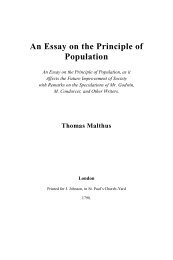On Liberty John Stuart Mill Batoche Books
On Liberty John Stuart Mill Batoche Books
On Liberty John Stuart Mill Batoche Books
You also want an ePaper? Increase the reach of your titles
YUMPU automatically turns print PDFs into web optimized ePapers that Google loves.
42/<strong>John</strong> <strong>Stuart</strong> <strong>Mill</strong>kind more and more in the acknowledgment of all important truths; anddoes the intelligence only last as long as it has not achieved its object?Do the fruits of conquest perish by the very completeness of the victory?I affirm no such thing. As mankind improve, the number of doctrineswhich are no longer disputed or doubted will be constantly on theincrease: and the well-being of mankind may almost be measured by thenumber and gravity of the truths which have reached the point of beinguncontested. The cessation, on one question after another, of seriouscontroversy, is one of the necessary incidents of the consolidation ofopinion; a consolidation as salutary in the case of true opinions, as it isdangerous and noxious when the opinions are erroneous. But thoughthis gradual narrowing of the bounds of diversity of opinion is necessaryin both senses of the term, being at once inevitable and indispensable,we are not therefore obliged to conclude that all its consequencesmust be beneficial. The loss of so important an aid to the intelligent andliving apprehension of a truth, as is afforded by the necessity of explainingit to, or defending it against, opponents, though not sufficient tooutweigh, is no trifling drawback from, the benefit of its universal recognition.Where this advantage can no longer be had, I confess I shouldlike to see the teachers of mankind endeavouring to provide a substitutefor it; some contrivance for making the difficulties of the question aspresent to the learner’s consciousness, as if they were pressed upon himby a dissentient champion, eager for his conversion.But instead of seeking contrivances for this purpose, they have lostthose they formerly had. The Socratic dialectics, so magnificently exemplifiedin the dialogues of Plato, were a contrivance of this description.They were essentially a negative discussion of the great question ofphilosophy and life, directed with consummate skill to the purpose ofconvincing any one who had merely adopted the commonplaces of receivedopinion that he did not understand the subject—that he as yetattached no definite meaning to the doctrines he professed; in order that,becoming aware of his ignorance, he might be put in the way to obtain astable belief, resting on a clear apprehension both of the meaning ofdoctrines and of their evidence. The school disputations of the MiddleAges had a somewhat similar object. They were intended to make surethat the pupil understood his own opinion, and (by necessary correlation)the opinion opposed to it, and could enforce the grounds of the oneand confute those of the other. These last-mentioned contests had indeedthe incurable defect, that the premises appealed to were taken from au-



